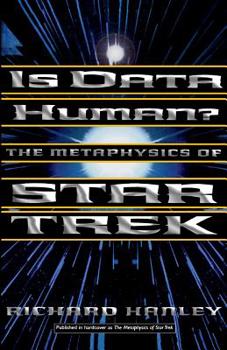Is Data Human?: Or, the Metaphysics of Star Trek
Select Format
Select Condition 
Book Overview
In the tradition of The Physics of Star Wars, this book explores the philosophical ideas and dilemmas that abound in the Star Trek series. This description may be from another edition of this product.
Format:Paperback
Language:English
ISBN:0465045480
ISBN13:9780465045488
Release Date:April 1998
Publisher:Basic Books
Length:272 Pages
Weight:0.48 lbs.
Dimensions:0.7" x 5.5" x 8.6"
Customer Reviews
5 ratings
Don't Bother....
Published by Thriftbooks.com User , 9 years ago
read it for fun, found 8 mistakes in it - the writer is an idiot...
A mixed bag.
Published by Thriftbooks.com User , 23 years ago
First of all, I agree with Murray Moffat that the first part of this book, which dicusses the criteria of personhood (a moral concept) is boring. This is because it is too loosely written. Hanley's discussion seems unfocused; sometimes one paragraph does not seem to follow from another. I still have not figured out what precisely the author concludes about organisms that display linguistic behavior, for instance. His comments on this issue are scattered, and, I believe, are never satisfactorily brought together. Chapters 4 and 5 of Part II constitute by far the best part of the work. In these chapters, Hanley discusses personal identity over time, i.e. synchronic identity, in opposition to diachronic identity, or identity at an instant, discussed in the first part. The first part of the book asks, "How can we identify a person?" and the first two chapters of the second part ask, "How can we identify the SAME person at two different times?" Hanley makes a compelling case (though, ultimately, I cannot agree) in the second part that continuity of psychology or pscychological states must be our guide in determining who is the same person as whom. The final chapter, chapter 6, seems somewhat disconnected from the rest of the book in discussing time travel, though this topic obviously fits with the general theme of the book. It is a satisfying discussion, though not as lively as that in the preceding two chapters. The epilogue seems preachy and entirely out of place, but only comprises a few pages. So, the rating for this book breaks down as follows:Part I (chapters 1-3): 3 starsChapters 4 and 5: 5 starsChapter 6: 4 starsEpilogue: 1 starAveraging, but discounting the epilogue (since it is so short), we arrive at the rating of 4 stars for the book overall.
I Hated Star Trek
Published by Thriftbooks.com User , 25 years ago
...until I read Richard Hanley's book. I read this book while taking Hanley's Philosophy 102 class and it really helped me understand the basic philosophical questions we were tackling. It also helped me understand why people are so obsessed with the Star Trek shows. It reminded me of Sophie's World-both books teach you about philosophy and get you thinking without boring you to death.
More thought provoking than your usual Star Trek episode.
Published by Thriftbooks.com User , 26 years ago
I really would only recommend this book to Star Trek fans, since the author frequently refers to the episodes. They would probably find it very intriguing. I still was able to enjoy it because I knew a little about philosophy and AI; however, if you're not familiar with Star Trek or philosophy of mind, then don't bother. Of course, that should go without saying...
A challenging lecture!
Published by Thriftbooks.com User , 28 years ago
Don't be misled by the title: even people who haven't seen the series will really enjoy the contents of this book. The Star Trek universe is used in a very agile way by Hanley to analize quite an interesting number of subjects, offering his point of view, and opening the door for hours of stimulating discussion. Richard Hanley challenges the reader to reconsider (or perhaps consider seriously for the first time) a number of philosophical issues concerning our existence: what are the basic elements of our human nature (or our personhood); life after death; mind over matter... Hanley uses the plots of different chapters of ST to make the reader think. It does not matter if the depicted scenarios are not possible with today's technology, because what really is important is the analysis of situations. For instance, as a very small sample of what you will be discussing: - Willl androids eventually become life forms, with rights of their own? - Is it possible to alter the past? Is it possible to alter the future? Finally, a personal contribution for more philosophical discussion. In the episode of Unnatural Selection, we are put face to face with the Fountain of Eternal Youth: the transporter! It's so simple to use: you store all the physical identity of yourself, say at age 20 (better make some backups too, just in case!), when you have excellent health. Any time in the future, say 20 years after (or every year, suit yourself!), you put yourself in the transporter, and they beam you somewhere (inside the same ship will do just as well!). The only thing that you have to do is ask the operator to rematerialize you using the physical information of yourself at age 20. Voilá! A very stimulating book indeed!







